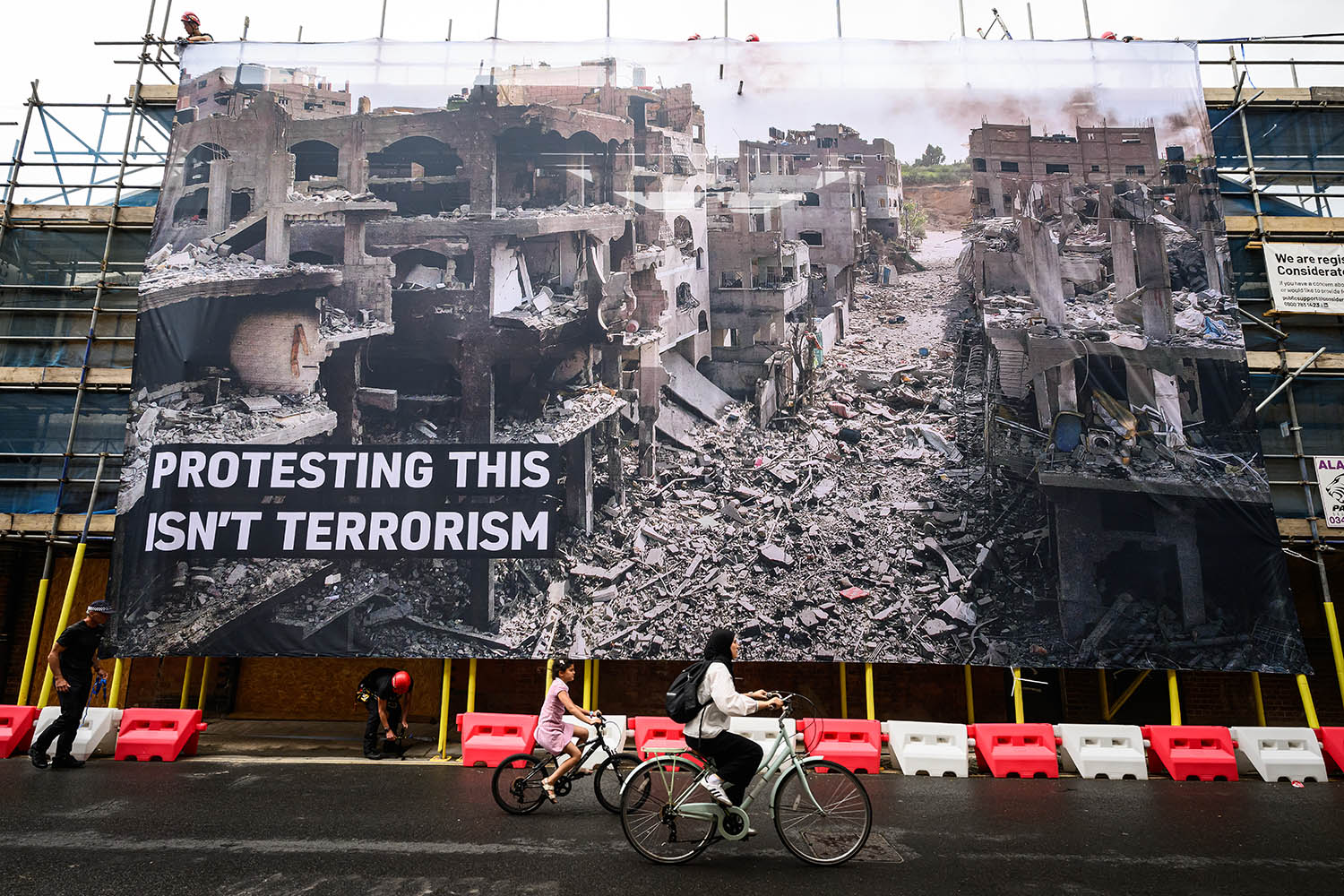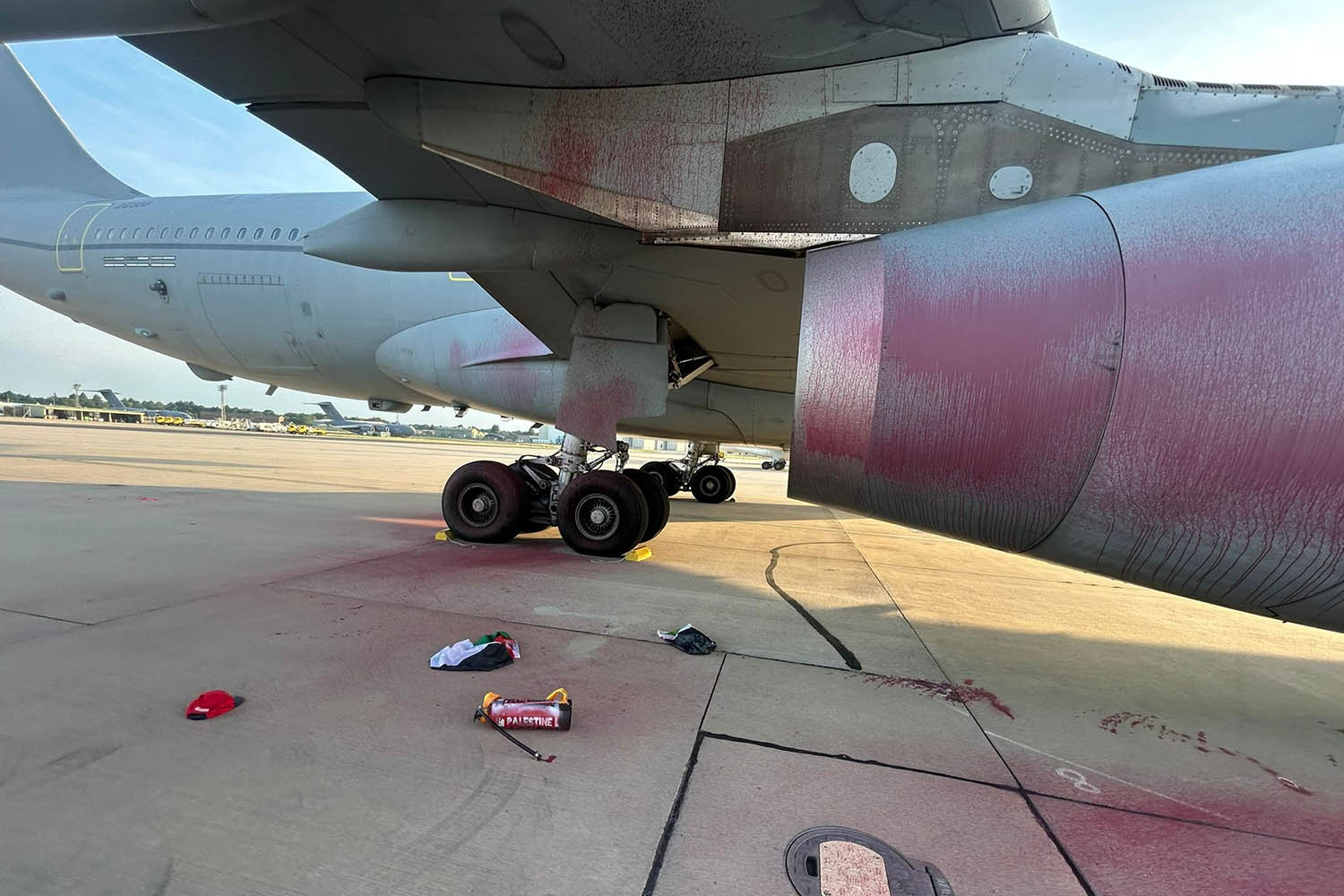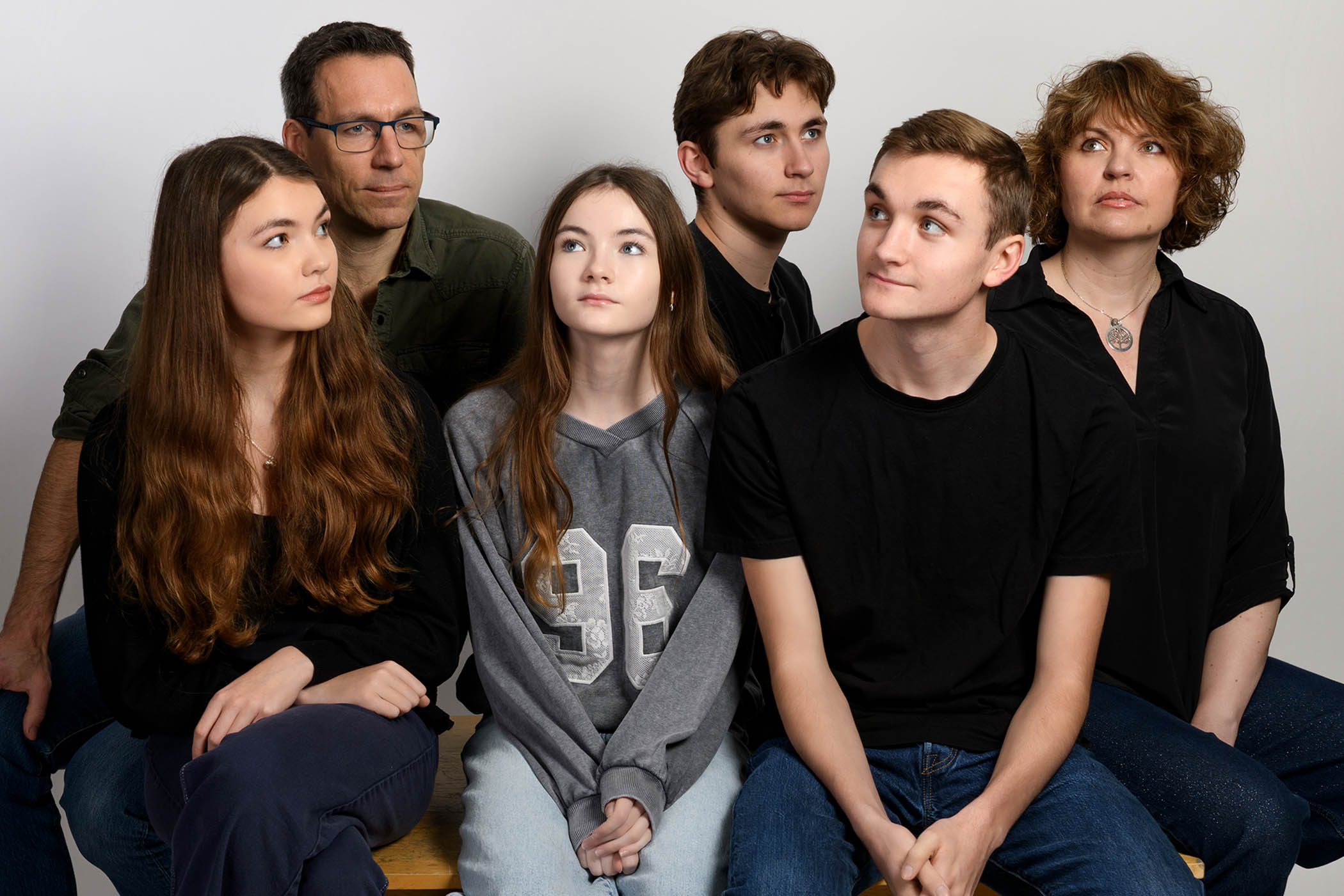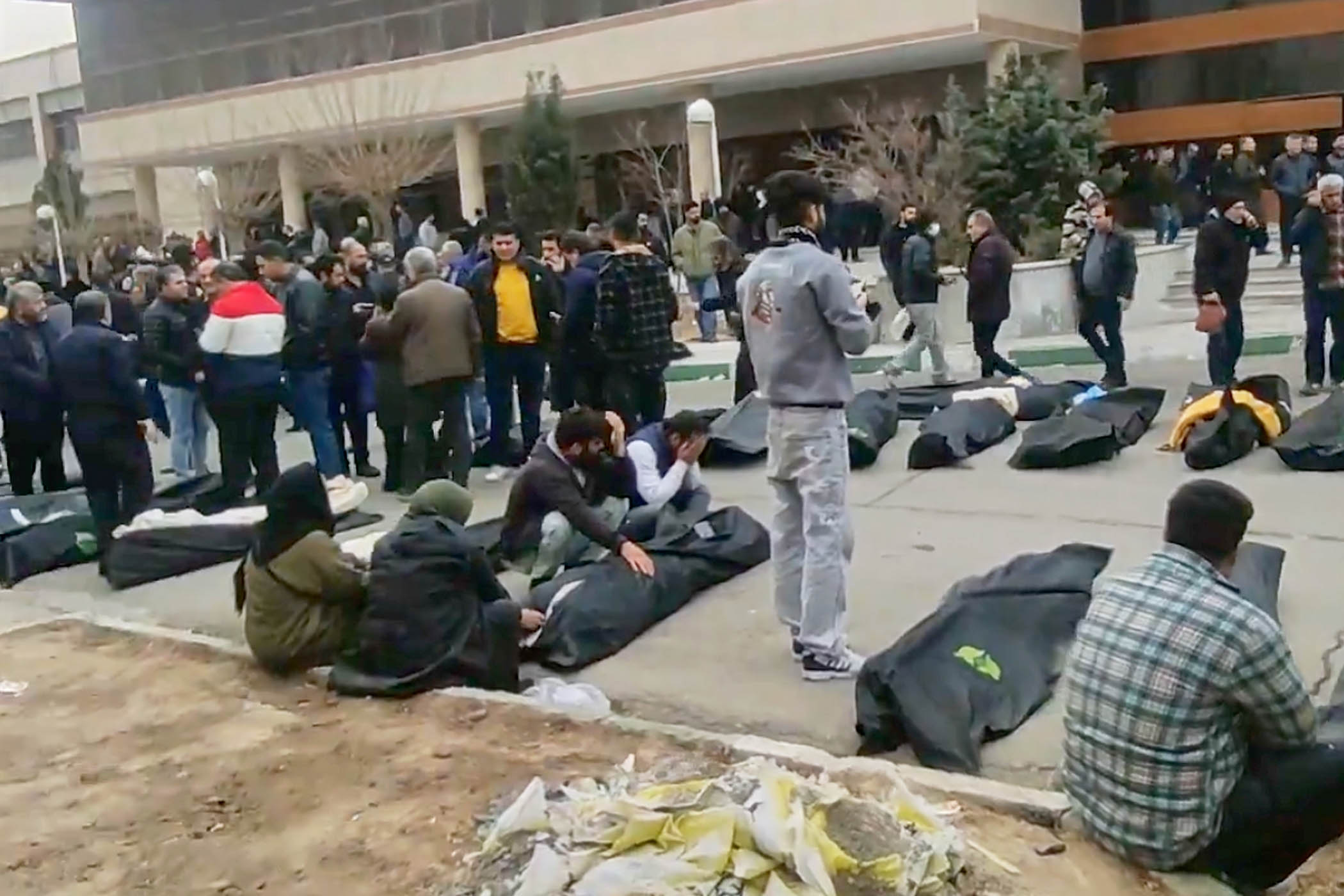Flecks of red paint – the calling card of Palestine Action – are still visible on the forecourt and shopfront of an accountancy firm in Stamford Hill, north London. One of its employees, wearing the modest black suit that denotes his Hasidic Jewish faith, thumbs a spot of paint left on the boardroom table after the window was smashed by activists targeting the business in May.
“People in the area were shocked,” he says, speaking on condition of anonymity. “They were scared because they didn’t know why we had been targeted.”
The owners did. The activists stencilled a message on the forecourt in spray paint. It read: “Drop Elbit” – a reference to the Israeli arms manufacturer. The Stamford Hill business owns an industrial park in Kent where a subsidiary of Elbit has a factory – although the firm said it had sold Elbit’s plot and had been wrongly targeted.
‘How have we got into a situation where we are arresting elderly women for holding a protest sign?’
‘How have we got into a situation where we are arresting elderly women for holding a protest sign?’
Sir Peter Fahy, ex-police chief
The attack is one of more than 385 acts of criminal damage carried out by Palestine Action since 2020. The direct action protest group had stepped up its activism in recent months in response to Israel’s bombing and starvation of Palestinians.
The experience of the Stamford Hill business, and of two other Jewish-owned sites, played a significant part in the decision last month by the home secretary, Yvette Cooper, to proscribe Palestine Action as a terrorist organisation.
The final straw for the government appears to have been a raid by activists on RAF Brize Norton on 20 June. Protesters broke through a perimeter fence, sprayed red paint into the engine of an Airbus air-to-air military refuelling plane and caused an estimated £7m of damage.
A fifth suspect was arrested this weekend in connection with the vandalism. The 22-year-old man was arrested on suspicion of the commission, preparation or instigation of acts of terrorism, said counter-terrorism policing south-east.
Within two weeks of the break-in, MPs and Lords had voted to ban the group under terrorism laws. But last week, one of its founders won permission to challenge its proscription, with the high court ruling that the decision should be reviewed.
Related articles:
In his ruling, Mr Justice Chamberlain questioned the ban’s impact on free speech and said the potential for people to argue against their prosecutions with possibly conflicting decisions by different courts was a “recipe for chaos”. The review will be heard in November.
Huda Ammori, who co-founded the group and brought the judicial review, called it a “landmark decision”, adding: “We will not stop defending fundamental rights to free speech and expression in our country and supporting Palestinian people against a genocide being livestreamed before our eyes.”
Newsletters
Choose the newsletters you want to receive
View more
For information about how The Observer protects your data, read our Privacy Policy
Since Cooper’s order was voted through, about 204 people – a retired headteacher, 67, a former magistrate, 81, and a retired priest, 83, among them – have been arrested under terrorism laws for supporting the group. This is almost as many people as were arrested for all terror-related activity in the UK in 2024. A planned protest could involve 500 more people breaching the proscription order.

A protest banner opposite Labour’s HQ in London
Proscription legislation was part of measures in the Terrorism Act 2000 aimed at closing perceived loopholes around terrorist financing and the glorification of terror. In all, 21 groups were proscribed in 2001, including the military wing of Hamas, the external security wing of the Lebanese militia Hezbollah and the Kurdistan Workers’ party. More recently, the list has included Hamas’s political wing and the Russian Wagner Group of mercenaries and the domestic far-right group National Action.
Before the vote on Palestine Action, judicial review hearings at the high court, which included closed hearings for sensitive material, were told that the Joint Terrorism Analysis Centre, made up of officials from the security services, police and government departments, assessed only three incidents – the attacks in Stamford Hill were not included – as potentially meeting the threshold for terrorism.
Those incidents are understood to have occurred at sites belonging to weapons companies – among them Elbit, which makes drones in the UK and has contracts with the British armed forces.
Neil Basu, a former head of counter-terror policing in the UK, said he was “very surprised” at the proscription, but that the attack on Brize Norton “crossed a clear line at a time when the country is on a war footing”. He questioned whether damage to property meets the average person’s definition of terrorism. “I think, for most people, that means [a] threat to life, but the legislation covers serious damage to property.” Other incidents include an alleged plot to obstruct the London Stock Exchange and a break-in at an Elbit factory in which a police officer was injured. The UK security minister, Dan Jarvis, briefed about a dozen MPs, including senior opposition figures, under confidential privy council terms.
Basu said he no longer receives security briefings, but he would be amazed if there were not more intelligence on Palestine Action to justify the proscription. He urged the government to be more transparent if such intelligence existed. “It’s important that the public are properly informed, and if I were doing the job, I would be pushing to share as much information as possible.”
However, The Observer understands that the drive for proscription came from the Home Office and police, rather than MI5. Well-placed sources said some reports that Palestine Action had potentially received Iranian funding, which were attributed to the Home Office before the proscription vote, were considered to be wide of the mark.
Allegations of antisemitism and its impact on communities were raised in both houses of parliament after the Stamford Hill incident and separate cases of vandalism in Hampstead, another London neighbourhood with a large Jewish population. Red paint was sprayed on the offices of the UK branch of the Jewish National Fund, a Zionist charity, and of the pro-Israel lobbying group Bicom (the Britain Israel Communications and Research Centre). Activists who allegedly ram-raided an Elbit site near Bristol last August have spent nearly a year on remand after a police officer was wounded with a sledgehammer.
The employee of the Stamford Hill firm said the activists were “totally cuckoo” and that it had been impossible to negotiate with them as they repeatedly targeted Elbit’s Instro Precision factory in Kent. But he added: “It isn’t about Jewish or not.” Although he said he believes Palestine Action are “antisemitic in general”, he said: “It’s nothing to do with antisemitic. They are targeting an Israeli arms company.” In fact, he added: “If they [knew] our religious view, we are not so pro-Israel.” The owners are from the Satmar Hasidic sect, who believe that “Jews are not allowed to have their own state before the messiah comes, or have our own land, our own military,” he said.
Pressure on the UK government to ban Palestine Action began before the Hamas attack on Israel in October 2023. Senior staff at Elbit started to meet government officials to discuss the activists in 2022 and have repeatedly pressed for more severe punishments for protesters.
Three unnamed Home Office officials met Elbit representatives again in December last year to discuss radar procurement. The department said any suggestion the meeting influenced the proscription was “categorically false”.
Proscription was first mooted by crossbench peer John Woodcock in a report issued last May. Lord Walney, who as a Labour MP was head of the Labour Friends of Israel, cited Palestine Action as an example while calling for the creation of a new “proscription light” order for protest groups such as Just Stop Oil that were engaged in repeated criminality.
We Believe in Israel, a lobby group set up by Bicom and directed until his election last year by Luke Akehurst, Labour MP for North Durham, published two reports calling for Palestine Action to be proscribed.
In one, the group made claims about a “classified” Metropolitan police briefing in which it said that in 2022 Palestine Action members had been “investigated under counter-terrorism protocols following intelligence suggesting contact between some of its members and individuals linked to Hamas-aligned networks abroad”. The Met said it had no record of any such briefing. We Believe in Israel did not respond to requests for comment.
The consensus in Westminster seems to be that Palestine Action needed to be stopped and although proscription was not the perfect tool, it would have to do. Cooper has been accused of a cynical move to push the vote through by adding two unrelated terror groups – the Maniacs Murder Cult and the Russian Imperial Movement – to the order before the vote. With Palestine Action sandwiched between such extreme organisations, it would have put any MPs who did not wish to proscribe the protest group in a difficult position.
The decision had a unanimous recommendation from the Proscription Review Group, which comprises officials from across government departments, the Home Office said.
The order, approved in the Commons by 385 votes to 26, has been interpreted differently by different police forces. Armed officers threatened to arrest a woman for protesting alone in Canterbury with a Palestinian flag, a sign saying “Free Gaza” and another saying “Israel is committing genocide”. Police said these were supportive of Palestine Action and read the proscription legislation to her.
By contrast, the Police Service of Northern Ireland has made no arrests. In County Derry, two councillors wore T-shirts supporting Palestine Action as the council ignored its own legal advice and voted to call for all criminal cases against those arrested across the UK to be dropped. In Cornwall last week, the journalist and activist George Monbiot sat on a spot where eight people had been arrested a week earlier. Monbiot’s placard read: “Palestine Action are protesters not terrorists.” Neither he nor his fellow protesters were arrested.
Sir Peter Fahy, a former policing lead for the Prevent counter-extremism scheme, said: “It’s putting the police in a fairly difficult position. How have we got into this situation where we are arresting elderly women for holding a sign?” He added that “things have moved a lot” since proscription was introduced in 2000 to deal with al-Qaida-inspired terrorism. “I’ve got no idea what intelligence they might have. If people are prepared to get onto military sites, they might be prepared to commit more serious offences.
“I think if you ask most people what terrorism is, they would be quite surprised at what can fall under the definition. I think the situation is such that there needs to be a fundamental review of terrorism legislation.”
Cooper said: “When we have seen horrific and intolerable scenes of suffering in Gaza, the continued right for the public to protest and express strong views remains as fundamental as ever. The proscription order is not about Palestine; it is about one narrow, specific organisation operating in the UK, on the basis of repeated security assessments and advice, following serious attacks they have committed or sought to organise.”
Tim Crosland, who leads the group Defend Our Juries, has been organising protests since the proscription. He said the objective on Saturday would be to overwhelm London’s police cells. “If police stop arresting us ... we’ve proved our point. If you’re not arresting people under the Terrorism Act, it’s not terrorism.”
Crosland added: “The way we approach it is: we can’t lose this. If police stop arresting us, then that’s what we want and we’ve proved our point. If you’re not arresting people under the Terrorism Act, it’s not terrorism. If people do get arrested, that’s dramatic and a jury can decide.”
Photograph @FLO360aero and Getty



